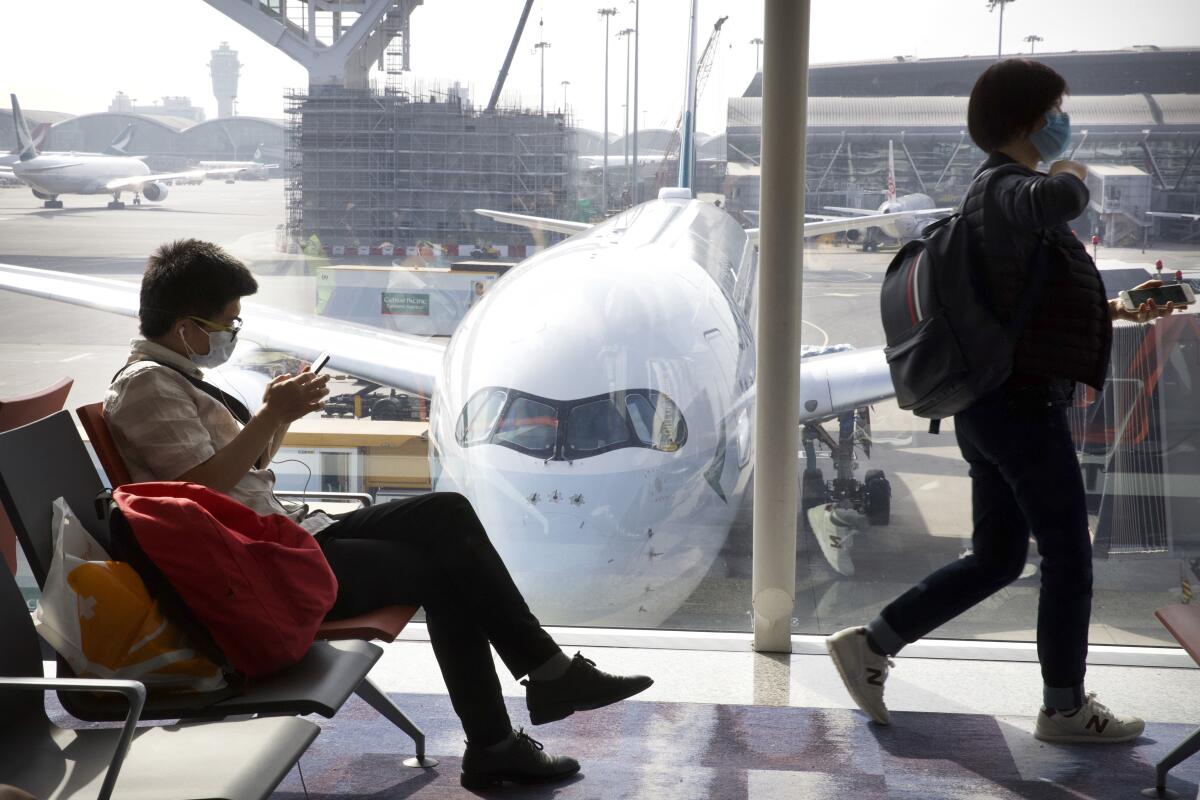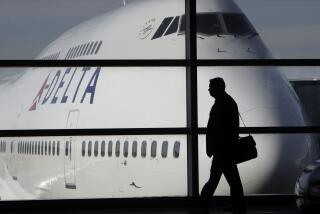American and Delta halt all China flights amid coronavirus outbreak

- Share via
Responding to the deadly outbreak of coronavirus, two of the world’s largest airlines announced Friday a temporary halt to all flights to China following a new travel advisory from the U.S. State Department about the health risks of travel to the country.
Hours later, the Trump administration said that the U.S. would temporarily suspend entry of any foreign nationals who have traveled in China, and any U.S. citizen who has traveled through the Hubei province in the last 14 days will be quarantined for 14 days. Flights from China will be directed to seven U.S. airports, including Los Angeles International Airport, where enhanced public health screenings will be required for Americans returning from China.
American Airlines, the largest global carrier, announced an immediate suspension of all flights to and from China through March 27. Delta Air Lines said it would halt all flights to China through April 30, with the suspension starting Feb. 6 to provide service to those travelers who want to leave China amid the growing health scare.
Fort Worth-based American had previously announced plans to temporarily suspend two popular routes from LAX to Shanghai and Beijing from Feb. 9 through March 27, but was sued Thursday by its pilots union, which demanded a halt to all service to China to cut the health risk to flight crews on the international routes.
In response to the outbreak, Delta Air Lines had also previously announced plans to reduce by half its daily flights to Beijing and Shanghai, down to 21 flights a week, between Feb. 6 and April 30. That included flights from LAX to Shanghai.
United Airlines, among the world’s largest carriers, adjusted a previous reduction in flights, suspending flights starting Feb. 6 between major U.S. airports and Beijing, Chengdu and Shanghai. It will continue to operate a daily flight between San Francisco and Hong Kong. The Chicago-based carrier had previously said it would begin cutting flights to China on Feb. 8.
Other carriers, including British Airways and Asian budget carriers Lion Air and Seoul Air, suspended flights to China earlier in the week, while several carriers such as Finland’s Finnair, Hong Kong-based Cathay Pacific and Singapore-based Jetstar Asia reduced the number of flights.
Nearly all of the carriers said they plan to waive reservation change fees so that passengers can rebook flights for a later date.
The State Department issued a travel advisory Friday against travel to China, about a week after ordering all nonemergency U.S. personnel and their family members to leave Wuhan, the epicenter of the outbreak. Friday’s advisory was the strongest issued so far by the department, saying Americans should not travel to China and those already in the country should “consider departing using commercial means.”
When the World Health Organization deemed the outbreak on Thursday a “public health emergency,” it said it “does not recommend any travel or trade restriction based on the current information available.”
If the health scare continues for a prolonged period, it could have a significant impact on United, Delta and American Airlines because all three began over the last few years to increase routes to China to serve a burgeoning middle class that was spending, on average, about $6,000 per visit to the United States.
Los Angeles, San Francisco, Las Vegas and New York had been the top destinations of Chinese visitors.
Airline industry experts say the impact of the flight suspensions on the multibillion-dollar industry depends on how long the health crisis continues without a resolution.
“The impact is going to be in the millions of dollars,” said Henry Harteveldt, a travel industry analyst for the Atmosphere Research Group. “But we don’t know if this will be a $50- to $100-million financial hit or a $100-million or more hit.”
More to Read
Inside the business of entertainment
The Wide Shot brings you news, analysis and insights on everything from streaming wars to production — and what it all means for the future.
You may occasionally receive promotional content from the Los Angeles Times.











